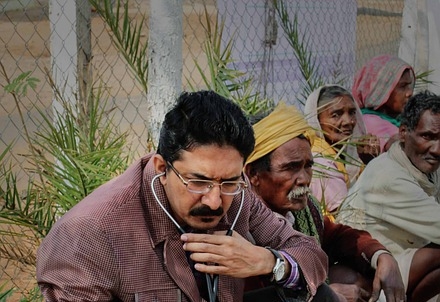The National Rural Employment Guarantee Act (NREGA) promises to provide a minimum of 100 days of guaranteed employment in one fiscal year to every rural household. Implicit in the scheme is building rural infrastructure and making real the concept of 'decentralised planning'. The central government also prepared operational guidelines to put the provisions of the Act into motion. Further, the Act requires that each state government formulate its own scheme of implementation. In Orissa, the scheme has been named as the Orissa Employment Guarantee Scheme (OREGS).
Ground realities of NREGA works in Orissa
The NREGA is a well-thought out legislation because it has provided for tackling embezzlement as well as ensuring execution. Still, the Act seems to be faltering in Orissa. But the Right to Information (RTI) act, a powerful tool for seeking accountability from government authorities, can be made use of for better implementation of the NREGA, as some cases in the state have already demonstrated.
In Elengabalsa village of Bandhugaon Gram Panchayat of Koraput district, the Panchayat authorities issued 40 job cards within seven days of an RTI application.
They also promised to deliver the rest and requested the applicant to withdraw the RTI application.
- All families had not been registered
- Many had not received job cards
- In some instances, work days were already entered in the cards at the time of their issuance
- Sometimes, number of work days mentioned was more than what people had put in
- Names had been entered wrongly in some cases; in others dead people's names were included
- NREGA work had not yet begun in some areas and where work had started minimum wages were not being paid or then wages were not being paid on weekly basis
- Application forms to get job cards were not available in some gram panchayats
- Contractors were doing the work in most cases
- Village level leaders or 'Gram Sevaks' themselves sold work illegally to the traditional contractor (one such case from Mayurbhanj district is in court of the state government)
- No village level vigilance and monitoring committees in some places
- Data was not available in some GPs and blocks and where it was available, it was not correct when crosschecked with people and official website on NREGA.
In view of these observations, it has become imperative to invoke the accountability provisions of the NREGA. Towards this end, the RTI Act can work well and in tandem with the NREGA. In fact, there have already been some successful examples of people using the RTI Act.
For example, the villagers of Elengabalsa village of Bandhugaon Gram Panchayat of Koraput district filed an RTI application to know the number of job cards issued in the village; why all the households, who by this time should have got the cards, had not received them; who were the officers guilty of violating the provisions of the Act, etc. The RTI Act worked as a miracle. The Panchayat authorities issued 40 job cards within seven days of the RTI application; promised to deliver the rest within some days and requested the applicant to withdraw the RTI application. In a similar case in the Tumudibandh block of Kandhamal district, the Block Development Officer, responding to an RTI appeal, immediately released 500 job cards promising to give the rest eventually.
NREGA's grievance redressal
The NREGA provides that in case of any grievance, a person can file a complaint with the Programme Officer (BDO, in the case of Orissa). According to the section 23(6) of the Act, the Programme Officer is duty bound to dispose the complaint within seven days and in case it relates to a matter to be resolved by any other authority, it is to be forwarded to the same authority and the complainant has to be intimated. In line with these provisions, the OREGS (the state scheme) says there will be grievance redressal mechanism including a system of appeal. The appeal against the Gram Panchayat will be to the BDO, then to the Collector and finally it goes to the State Programme Coordinator. It states that the grievance petitions will be disposed within 15 days and the appeals within 30 days. The NREGA itself says that in case any authority is found guilty of violating the provisions of the Act after a proper inquiry, s/he shall be fined up to Rs.1000 in a single case.
However in some cases, it has come to light that the authorities are not taking complaints seriously despite the mandate of the Act. In such cases, where the authority deliberately ignores action on a complaint, the aggrieved citizen may make use of the RTI Act to seek the progress of his complaint. Because the quantum of penalty in case of RTI Act is substantially higher (Rs.250 per day of default if the information sought is not released within 30 days), the use of it is more likely to act as an effective deterrent against violations.
It has often been noted that officials in Orissa prefer acting on the RTI application/complaint and request the applicant to withdraw the RTI application, especially with the immediate threat of penalty looming large and the subsequent answers to be given in case of non-response. However, if the PIO does not provide the information within a month, or if s/he does not act on the complaint, the applicant can exercise the option of using the channel of appeal.
NREGA situations where RTI can be used
Activists and citizens in Orissa have been able to document a number of malady situations for which the RTI route can be taken as the remedy mechanism:
- Not provided with the job cards after registration of name (job card should be provided within 15 days of registration (Central government operational guideline)
- Default by GP and the Block Programme Officer to provide minimum of 100 days of employment in a financial year to a household
- Non-payment of minimum wage of Rs.55 (now proposed to be revised to Rs.70)
- Non-adherence to the provision that wages are to be paid within a week, not later than a fortnight, and at least 25 per cent of payment to be made in cash, rest may be in kind
- Not getting unemployment allowance, which is 1/4th of the total wage for first 30 days and ½ of the wages for the remainder of the financial year, in case the applicant does not get work within 15 days of submitting the application
- Not getting extra payment of 10 per cent of the wage for conveyance in case the person is provided with work beyond 5 km radius
- Contractors have entered into the implementation of the projects in some form or other
- In case when at least 1/3rd of the beneficiary are not women
- In case when the details of the scheme are not publicised at the worksite
- Non-availability of basic amenities at the work place like drinking water, shade for children, first aid box, separate toilet for women, etc
- Harassment and discrimination of women at the workplace
Form-A, provided in the Orissa RTI rules, may be filled and information sought on the progress made on the complaint filed. The applicant may ask the Public Information Officer (PIO) of the respective office to provide the following information:
- The daily progress of the complaint.
- According to the section 23 (6) of the act Programme Officer is duty bound to dispose the complaint within seven days Is this official guilty of violating the act for not acting within the stipulated period?
- What action has been taken against the official for violating the act? If no action has been taken, then when will it be taken?
- When will the complaint be disposed?
Social audit and vigilance of NREGA works
Social audit is a technique of ensuring accountability of public servants to the public. Keeping aloft the spirit of RTI, section 17 of NREGA clearly dictates that the Gram Panchayat must make available all relevant documents of the works done to the Gram Sabha for social audit. Under section 10.7.1 of the operational guidelines for NREGA prepared by the central government, for every work, there should be a local vigilance and monitoring committee consisting people of the locality or the village to monitor the progress and quality of the work. The final report of the committee is to be attached with the completion certificate of the work and should be placed before the next meeting of the concerned Gram Sabha. Section 10.1.1 of the same guideline clearly directs that RTI Act should be followed both in letter and spirit in all matters relating to NREGA, and section-4 of the act, which concerns pro-active disclosure, should be strictly complied with at all levels. By implication, any individual citizen can inspect the public documents held by any public authority and can take extracts and photocopies paying requisite fees.
In the Anantpur district of Andhra Pradesh, a social audit was conducted by the members of the public with the initiative of the government, during 2-7 September 2006. According to Rashid Khan, Under Secretary, in the NREGA cell of Panchayati Raj department, Government of Orissa, the state is planning to conduct a similar social audit in Kalahandi and Mayurbhanj districts on pilot basis. Social audits can bring manipulations in the muster roll, bills, vouchers, measurement books, sanction orders etc., under the fierce gaze of the public. Under NREGA, the wage component is to be 60 per cent of the total project cost and the remaining 40 per cent is to be channelised toward the material component. This is also one of the aspects that can be verified through a social audit.
Also, the anomaly between the guarantee of minimum wage on one hand and proportionality between wages with output in work, which had all the potential of damaging the Act, has been rectified by the government by revising the Schedule of Rates (SOR). The rate for digging 100 cubic feet of soft soil has been revised from Rs.50 to Rs 100; for hard soil, the revision is from Rs.67 to Rs.135 and for stony soil from Rs.105 to Rs.210.
Confusion regarding notification of the OREGS
Under section-4 of the NREGA, every concerned state shall make a scheme within six months of the commencement of the Act. The act was notified on 7 September 2005 and came into effect on 2 February 2006. Therefore Orissa should have notified the scheme by March 2006. Similarly the state rules and the State Employment Guarantee Council should have come into the picture on time.
However, there is currently confusion in Orissa on whether the OREGS has been notified or not. The state government has been implementing NREGA by issue of government orders/circulars. This marks a clear state of adhocism. The government orders and circulars are also not on the department website. No OREGS complaint mechanism is in place, neither is there any clarity on the issue of disbursement of unemployment allowance. As a result, the public is absolutely ignorant and confused about making complaints and whom to approach for grievance redressal.
When asked, the officers of the Panchayati Raj department say that it has been notified. But neither is the notified scheme available on the official website or elsewhere nor are the officers providing a copy of the same when requested. Jean Dreze, former member of the National Advisory Council and the chief architect of NREGA, during his recent visit to the state, appealed to the state government to immediately notify the scheme, if it has not been done yet. With the officials of the Panchayati Raj department of the state not clarifying on the status of the scheme, the risk of failure of this powerful and entitling Act/scheme remains real.
In conclusion
Despite the necessary and carefully worked provisions in the NREGA, its guidelines and rules, it will be unfortunate if the implmentation of employment guarantees in Orissa fails due to the lethargy of the state government to discharge its responsibility. The state government must do its bit to fulfil the objectives of the Act. It should also engage in widespread dissemination of the provisions of the Act and ensure justice for those citizens victimised by the violation of the Act.
























